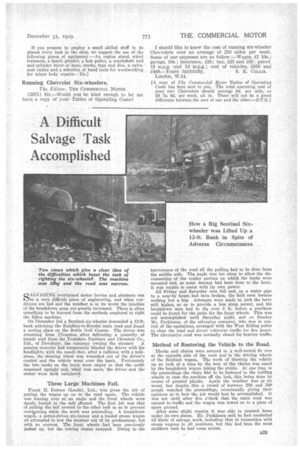A Difficult Salvage Task Accomplished
Page 63

If you've noticed an error in this article please click here to report it so we can fix it.
SALVAGINQ overturned motor lorries and steamers can be a very difficult piece of engineering, and when conditions are bad and the weather is at its worst the troubles of the breakdown gang are greatly increased. There is often something to be learned from the methods employed to right the fallen machine.
On December 3rd a Sentinel six-wheeler descended a 12-ft. bank adjoining the Keighley-to-Kendal main road and found a resting place on the Settle Golf Course. The driver was returning from Ulverston after delivering a quantity of tannic acid from the Yorkshire Dyeware and Chemical Co., Ltd., of Dewsbury, the company owning the steamer. A. passim,.t' motorist had temporarily blinded the driver with his headlights, with the result that, after a collision with a milestone, the steering wheel was wrenched out of the driver's control and the vehicle went over the bank. Fortunately the two tanks on the lorry were empty so that the outfit remained upright and, what was more, the driver and the stoker were both uninjured.
Three Large Machines Fail.
Frank H. Dutson (Leeds), Ltd., was given the job of getting the wagon up on to the road again. The vehicle was leaning over at an angle and the front wheels were deeply buried in the soft gtound. The first job was that of pulling the tail around to the other lock so as to prevent overtAirning while the work was proceeding. A breakdown wagcm, a petrol-driven six-tonner and a loaded steam wagon all attempted to tow the steamer out of its predicament, but with no success. The front wheels had been previously jacked up, but the towing chains snapped. Owing to the narrowness of the road all the pulling had to be clone from the middle axle. The angle was too steep to allow the disconnecting of the trailer portion On which the tanks were mounted and, as some damage bad been done to the lorry, it was unable to assist with its own power.
All Friday and Saturday rain fell and, as a water pipe to a near-by house had been broken, the field soon became nothing but a bog. Attempts -were made to jack the lorry still higher,. so as to provide a less steep ascent, and the breakdown men had to dig over 3 ft. before a purchase could be found for the jacks for the front wheels. This was not accomplished until Saturday night, and on Sunday Mr. Parkinson, of the salvaging company, who was in control of the operations, arranged with the West Riding police to close the road and divert vehicular traffic for five hours. The alternative road was normally closed for heavier traffic.
Method of Restoring the Vehicle to the Road.
Blocks and chains were secured to a well-rooted fir tree at the opposite side of the road and to the driving wheels of the Sentinel wagon. The work of drawing the vehicle up an inch at a time by the men at the chains was eased by the breakdown wagon taking the strain. At one time in the proceedings the chain had to be fastened to the trailing ,wheels to ease the machine off the lock, this being done by means of greased planks. Again the weather was at its worst, but despite this a crowd of between 200 and 300 people watched the proceedings occasionally giving their Opinions as to how the job would best be accomplished. It was not until after five o'clock that the main road was opened to traffic and the wagon was towed on to a piece of spare ground.
After some slight repairs it was able to proceed home under its own steam. Mr. Parkinson said be had conducted all kinds of salvage work, including that in connection with steam wagons in all positions, but this had been the most stubborn task be bad come across.




































































































